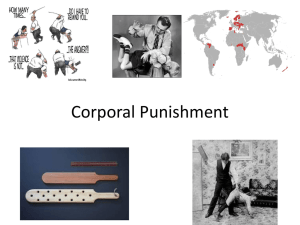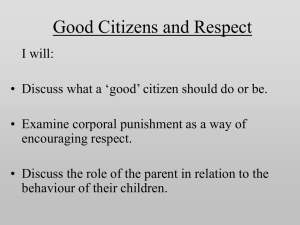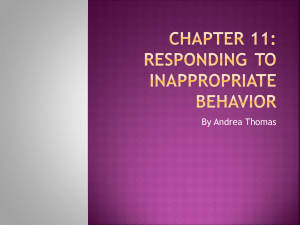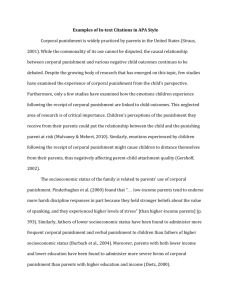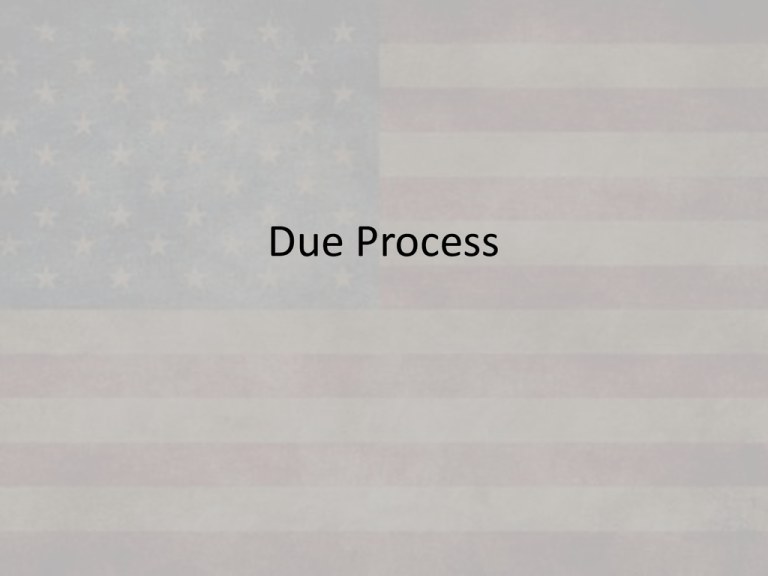
Due Process
Due Process
• A fundamental, constitutional guarantee that
all legal proceedings will be fair and that one
will be given notice of the proceedings and an
opportunity to be heard before the
government acts to take away one's life,
liberty, or property.
• Also, a constitutional guarantee that a law
shall not be unreasonable, arbitrary, or
capricious.
Due Process
• Arbitrary: subject to individual will or
judgment without restriction; unsupported.
• Capricious: subject to unpredictable change;
random, erratic
Due Process
• Fifth Amendment: no person “shall be
deprived of life, liberty, or property without
due process of law.” Applies ONLY TO THE
FEDERAL GOVERNMENT.
• Fourteenth Amendment (ratified in 1868)
declares, “nor shall any State deprive any
person of life, liberty, or property, without due
process of law.” Limits the POWER OF THE
STATES.
Ghosts of Mississippi
Medgar Evers (1925-1963)
Assassinated by Byron De La Beckwith
Objectives
• Background: what do we mean by “due
process?”
• Students will be able to:
– find government obligation regarding due process
in the Constitution
– Articulate what are the different types of due
process?
– Understand how much due process one gets?
What would be a fair procedure if the
government did the following?
•
•
•
•
•
•
•
•
•
If the government were to put you to death.
If you could go to jail for 6 months.
If you were to get an after school detention.
If you were going to lose your driver’s license.
If you were going to be suspended for 2 days.
If you were going to be suspended for 20 days.
If you were not able to marry the love of your life.
If you were kicked off of National Honor Society.
If you denied the right to end a pregnancy? What if doctors
said the birth of the child would kill the mother?
• If the government took your house from you to build the
last leg of 485.
Warm-up
• Watch the following video clip, and then
answer the following question: Is the state
action depicted a violation of the due process
clause? Why?
• CPS seizure
Objectives/agenda
• Warm-up: California CPS baby seizure
• Analyze: Due Process clause
– Procedural due process
– Substantive due process
– Incorporation
– Property interest
– Fundamental rights
Due Process: Two Types
• Procedural
– when the state or
federal government acts
in such a way that denies
a citizen of a life, liberty,
or property interest, the
person must first be
given notice and the
opportunity to be heard.
– Were proper procedures
followed?
• Substantive
– require all governmental
intrusions into
fundamental rights and
liberties be fair and
reasonable and in
furtherance of a
legitimate governmental
interest.
– Is gov’t action justified?
Due Process example: Child custody
dispute
• Procedural
– Government must
give notice and a
hearing before
determining custody
• Substantive
– Government must
show compelling
reason
demonstrating an
adequate
justification for
terminating custody
Incorporation doctrine
• Most of the provisions of the Bill of Rights
have been incorporated by the Fourteenth
Amendment to the states
– What is “fair” for the Feds should be “fair” for the
states
– Examples include freedom of speech, press,
religion, association/non-association, privacy
Due Process
• First question to ask: has the government
deprived someone of life, liberty, or property?
– No deprivation, no DP issue
• North Carolina passes a law forbidding
individuals from using nail clippers to cut
their nails and requiring instead that only
scissors be used. Is this a DP issue?
– Yes, because the state is seeking to regulate
individuals in a way which affects their liberty,
the law will be subject to Due Process review.
• Maryland passes a law that all owners of cars
manufactured prior to 1990 must pay an
additional “collector’s tax.” Is this a DP issue?
– Yes—the tax is a deprivation of property (i.e.,
money paid), and must pass DP review
Property interest
• A deprivation of property occurs when a
person has an entitlement and that
entitlement is not fulfilled
– Entitlement: reasonable expectation to continued
receipt of a benefit
Fundamental rights
• Some relation to rights of autonomy
(freedom) or rights of privacy
– Liberty interests
– C – Contraception
– A—Abortion
– M—Marriage—(Same sex—varies)
– P—Privacy
– E— (Private Education)
– R--Reproduction
Fundamental rights
• Gov’t involvement/regulation/restriction with
fundamental rights does NOT necessarily
mean violation of DP clause
– If gov’t can show a compelling interest
– Strict scrutiny standard: state must demonstrate
the compelling nature of its interest and the
necessity of the chosen means.
Fact pattern
• Massahampshire passes a law banning the use
of certain forms of birth control. These forms
of birth control, the state believes, have
contributed to an increase in sexually
transmitted diseases because they protect
against pregnancy but not STDs.
• Is there a compelling state interest?
Answer
• Since STDs have a high social cost, this is a
compelling state interest, says the
Massahampshire legislature. If a citizen brings
a substantive due process challenge to the
law, the state must show that their interest in
slowing the spread of STDs is indeed
compelling and that an outright ban on the
specified forms of contraception is necessary
to achieve the goal as there is no alternative
means available.
Goss v. Lopez
Goss v. Lopez
• What are the facts?
• What question is before the Court?
– Did the imposition of suspensions without
preliminary hearings violate the students’ Due
Process rights as guaranteed by the Fourteenth
Amendment?
Goss v. Lopez
• What and how did the Court decide?
– 5-4 vote; because Ohio had chosen to extend the
right to an education to its citizens, it could not
withdraw that right "on grounds of misconduct
absent fundamentally fair procedures to
determine whether the misconduct ha[d]
occurred."
Goss v. Lopez
• What and how did the Court decide?
• Ohio had to recognize students' entitlements to education
as property interests protected by the Due Process Clause
that could not be taken away without minimum
procedures required by the Clause.
• The Court found that students facing suspension should at
a minimum be given notice and afforded some kind of
hearing.
Poster project
Procedural due process “balancing
test”
• Once it is established there is a state
deprivation of liberty or property, next step is
to analyze necessary procedures:
– The importance of the private interest affected;
– Risk of erroneous deprivation through procedures
used, and the probably value of any additional or
substitute procedural safeguards;
– Importance of state interest and any additional
burdens on the state
• Joey Ramone is a student at High School High,
a public school. After being caught smoking in
the boys’ room by a hidden camera for the
third time in a month the Principal decides to
suspend him by sending a letter to that effect
to his parents who then bring a due process
claim against the school. The Ramones argue
that, at the very least, Joey should have been
given notice of the charge against him and
provided an opportunity to explain.
• Apply the balancing test to this fact pattern to
determine
Objectives
• Warm-up: response to corporal punishment in
schools video
• 1) Review the Eighth Amendment to the U. S.
Constitution
• 2) Review Ingraham v. Wright and analyze the
case and decision in light of the Eighth
Amendment
• 3) In groups, complete fact patterns, and create
your own due process fact pattern (poster)
Warm-up
• Watch the video, and answer the following
question regarding corporal punishment in
schools: do you favor the use of corporal
punishment in schools, or are you opposed? Are
there any instances you can imagine where
corporal punishment is a reasonable form of
school discipline?
• What if parents consent to corporal punishment?
• corporal punishment
Corporal punishment in NC schools
• The Associated Press reported on October 7,
2013 that North Carolina schools used corporal
punishment 184 times in the 2012-2013 school
year, a decline from 404 incidents in 2011-2012,
and a further decline from 891 incidents the
previous year. Most incidents were in Robeson
County (141).
• It is “on the books” in NC public schools (but not
used in CMS, so relax!)
• corporal punishment in CMS
Eighth Amendment
• Excessive bail shall not be required, nor
excessive fines imposed, nor cruel and unusual
punishments inflicted.
• Directed toward whom?
– Criminals convicted of a crime
– Does it apply to students in schools?
Ingraham v. Wright
Let’s review the facts:
What was the school policy in this case?
Was this a local or state law?
Describe the policy
How many “licks” was standard?
Describe Ingraham’s punishment
Ingraham v. Wright
• How did the Court begin their discussion?
• Does corporal punishment still play a role in
public schools (in 1977 and today)?
• What was the common law principle
governing corporal punishment?
– Reasonable but not excessive force to discipline a
child
Ingraham v. Wright
• What is to be taken into account when
determining whether the punishment was
reasonable?
– Seriousness of offense
– Attitude and past behavior of the child
– Nature and severity of punishment
– Age and strength of the child
– Availability of less severe but equally effective
means of discipline
Ingraham v. Wright
• Question before the Court:
– Does corporal punishment in public schools
constitute “cruel and unusual punishment” and
therefore violate a student’s Eighth Amendment
rights?
• Decision:
– The Eighth Amendment does not apply to the
paddling of children as a means of maintaining
discipline in schools.
Ingraham v. Wright
• The prisoner and the schoolchild stand in wholly
different circumstances:
– The prisoner is incarcerated in prison, which is brutal;
– Only unnecessary and wanton infliction of pain
constitutes “cruel and unusual” punishment
– Schools are open institutions monitored by the
community
– The student brings the support of family and friends
– Student has civil and criminal laws to protect him/her
Ingraham v. Wright
• Law--Because of the history in this country of
corporal punishment in the schools and the
overwhelming majority of cases associated
the protections of the 8th Amendment with
prisoners, corporal punishment in a normal
school setting shall not be afforded protection
under the 8th Amendment.


